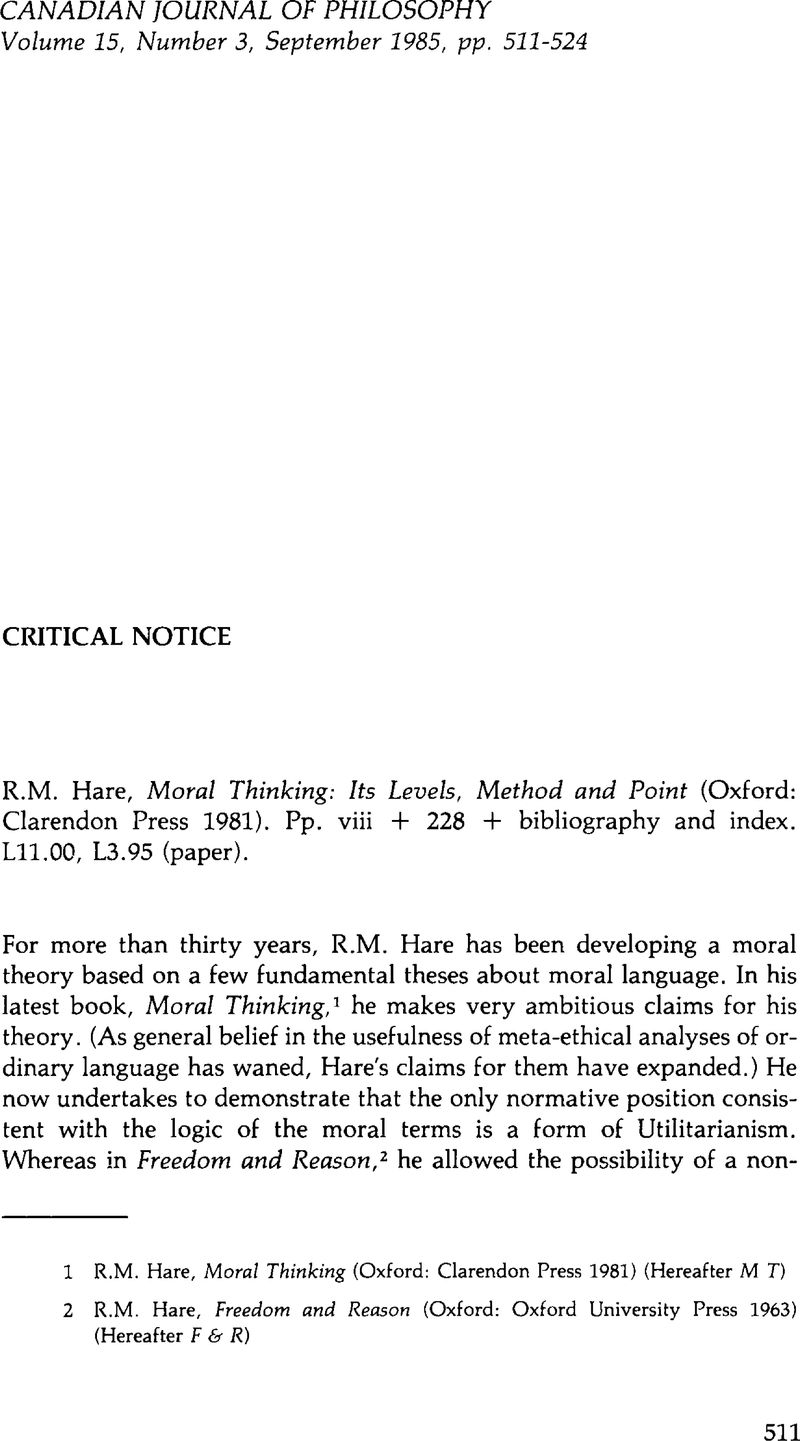No CrossRef data available.
Article contents
R.M. Hare Moral Thinking: Its Levels, Method and Point (Oxford: Clarendon Press 1981). Pp. viii + 228 + bibliography and index. L11.00, L3.95 (paper).
Review products
Published online by Cambridge University Press: 02 January 2020
Abstract

- Type
- Critical Notice
- Information
- Copyright
- Copyright © The Authors 1985
References
1 Hare, R.M. Moral Thinking (Oxford: Clarendon Press 1981)Google Scholar (Hereafter M T)
2 Hare, R.M. Freedom and Reason (Oxford: Oxford University Press 1963)Google Scholar (Hereafter F & R)
3 Hare, R.M. ‘Ethical Theory and Utilitarianism’ in Contemporary British Philosophy 4, ed. Lewis, H.D. (London: Allen and Unwin 1976).Google Scholar
4 Singer, Peter Practical Ethics (Cambridge: C.U.P. 1979).Google Scholar
5 Bernard Williams would criticise this as an attack on one's integrity. (The Utilitarian's) ‘own substantial projects and commitments come into it, but only as one lot among others - they potentially provide one set of satisfactions among those which he may be able to assist from where he happens to be …. (This) is to alienate him in a real sense from his actions and the source of his action in his own convictions.’ Williams, B. ‘A Critique of Utilitarianism’ in Smart, J.J.C. and Williams, Bernard Utilitarianism For and Against, (Cambridge: C.U.P. 1973), 115–6.Google Scholar I suppose that Hare would reply that Williams is importing intuitions into critical thinking, where they do not belong.
6 Rawls makes this point very clearly: Rawls, John A Theory of Justice (Cambridge, MA: Harvard University Press 1971), 187–8.Google Scholar
7 In any case, Hare must assume that we have a practicable measure of strength of desire, a notorious difficulty. If felt intensity is the criterion of strength, it is quite unclear that interpersonal comparisons are possible, and the strongest desire is not necessarily the determinant of action. If the criterion is behavioural. that is, stronger desires are defined as those with a greater influence on behaviour, then a person cannot know before they act which is their strongest preference, and cannot determine which action will satisfy it.
8 Barry, Brian The Liberal Theory of Justice (Oxford: O.U.P. 1973) 21–5.Google Scholar Hare claims that Rawls’ rational contractor theory with an ‘economical veil’ (a veil of ignorance just sufficient to secure impartiality) ‘is practically equivalent in its normative consequences to the ideal observer theory and to my own theory … and these normative consequences are of a utilitarian sort.’ Hare, R.M. ‘Rawls’ Theory of Justice’ in Daniels, Norman ed. Reading Rawls (Oxford: Blackwell 1975), 90–1.Google Scholar Rawls himself believes the same (Rawls, 185). If the arguments of this paper are correct, it is not true that the ideal observer theory (at least in Hare's version) must lead to utilitarian conclusions. (Benthamite Utilitarianism is only one form of want-regarding theory in Barry's sense.) If Rawls’ theory with an economical veil does indeed have similar consequences to the ideal observer theory, but these consequences need not be utilitarian, perhaps the additional conditions Rawls imposes on the knowledge and motivation of the contractors (which have been criticised as ad hoc) are unnecessary to his project of developing an alternative to utilitarianism.


